Jun 8, 2020
Guj, TN, Maha top in FSSAI food safety index for 2019-20
New Delhi, Jun 7 (PTI) Gujarat, Tamil Nadu and Maharashtra have topped an index that ranked states ensuring food safety in 2019-20, Food Safety and Standards Authority of India (FSSAI) said on Sunday.
The index ranks states on five parameters of food safety: human resources and institutional data, compliance, food testing facility, training and capacity building besides consumer empowerment.
Gujarat, Tamil Nadu and Maharashtra have topped in the list of larger states on the index.
Among the smaller states, Goa came first followed by Manipur and Meghalaya. Among Union Territories, Chandigarh, Delhi and Andaman Islands secured top ranks, FSSAI said in a statement.
This is the second index on food safety, which FSSAI released on the occasion of World Food Safety Day with the theme "Food Safety is everyone''s business" that was dedicated to those in the supply chain who have ensured the uninterrupted availability of safe food during this COVID-19 pandemic.
Food safety is a shared responsibility. The call to action for safe food on this day is: Ensure it''s safe, Grow it safe, Keep it safe, Eat it safe and Team up for safety," Health Minister Harshvardhan said in a webinar organised by FSSAI.
Health Secretary Preeti Sudan said the food safety index is an excellent incentive to create a sense of competition among states to improve food safety.
"As we are lifting the lockdown, we need to ensure adequate precautions are taken in restaurants and food service and delivery establishments. We must emphasize food safety through social media and other communication platforms," he added.
On this occasion, FSSAI also released an e-handbook on "Eat Right during COVID-19" for citizens. It highlights safe food practices to be followed diligently and tips on health and nutrition.
The food regulator has taken a series of steps to facilitate uninterrupted supply of safe food by the food industry during this pandemic.
An updated detailed guidance note ''Food Hygiene and Safety Guidelines for Food Businesses during the COVID-19 pandemic'' was released.
This document specifies hygiene and sanitary requirements, responsibility of management and sector specific requirements to prevent the spread of COVID-19 in the food supply chain along with a section on ''management of food establishments on identification of COVID-19 positive cases''.
FSSAI Chairperson Rita Teaotia and new CEO Arun Singhal were also present at the webinar.
Food Safety Deptt declares snack Fun Fine Puff ‘unsafe’
SRINAGAR, MAY 17: Food Safety Department today declared snacks “Fun Fine Puff” Brand Name “Parul Fun Fine Puff” “unsafe and misbranded,” under the provisions of Food Safety & Standards Act, 2006 Rules and Regulation, 2011.
The department issued the notice after they lifted the sample of the snacks Batch No: 696, which was declared by their laboratory as “Unsafe and Misbranded”.
The department has advised the public in general and the Stake Holders in particular in their own interest to discontinue use / stop sale and supply of above food product.
FHRAI issues reopening guidelines for hotel and restaurants
The Federation of Hotel & Restaurant Associations of India (FHRAI) in association with FSSAI and other key associations have come up with a detailed reopening manual for hotels and restaurants. The comprehensive guidelines highlights generic precautionary measures to be adopted in addition to specific measures to be ensured in hotels and restaurants to prevent spread of COVID-19. It also outlines preventive measures to minimize all possible physical contacts between staff and guests and maintain social distancing.
Here's a detailed look at the guidelines:
Mandatory golden rules to be followed all the times by fbo’s
- Physical distancing of at least 6 feet to be followed as far as feasible
- Thermal screening of guests and visitors before entering the premises
- Appropriate personal protection gears like face covers/masks, gloves and hand sanitizers etc.shall be made available by hotel to the staff as well as the guests. Staff should additionally wear gloves and take other required precautionary measures.
- Proper disposal of face covers / masks / gloves left over by guests and/or staff should be ensured.
- Adequate manpower shall be deployed by hotel management for ensuring social distancing norms.
- Installation and use of Aarogya Setuapp shall be advised to all.
- Cleaning and regular disinfection of frequently touched surfaces (door knobs, elevator buttons, hand rails, benches, washroom fixtures, etc.) to be made mandatory in all guest service area and common areas. Deep cleaning of all washrooms shall be ensured at regular intervals.
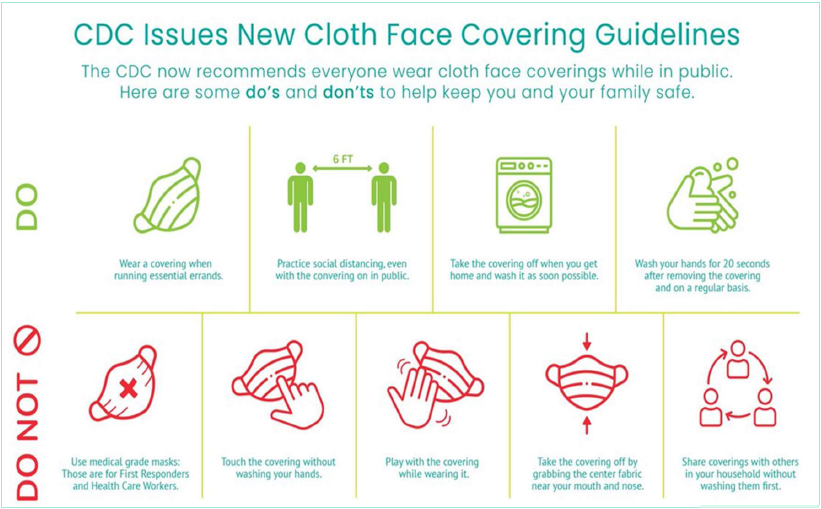
Covid 19 coordinator or special officer
- Appoint a special officer nominated from amongst managers who will be responsible for covid19 special response planning and implementation.
- The officer shall be the reporting person for all covid19 emergencies and capable of having decision making powers to implement things as announced by local authorities based on emerging conditions.
- The officer shall be supported by operations head, quality control, HR, loss prevention and medical officer connected with the property.
Facilities to face reopening challenge
- Replace finger touch bio-metric with alternate method
- Create screening place before time office with temperature monitoring and
- basic screening for Covid19 symptoms.
- Setup hand-wash stations at all staff zones like entry, lockers, toilets, cafeteria
- with soap solution and hand drying facilities, most importantly it shall be sensor
- based or foot operated.
- Enough space in kitchen & staff lockers.
- Spacing plan at pre preparation and production zones.
- Create 1 Isolation room for every 50 rooms.
Guest handling at front office
- Sanitise the touch points in car like seat, door knobs, hand rest etc with 70% alcohol.
- Drivers should be in full uniform with face mask and hand gloves.
- Before entering hotel, take guest luggage to a separate area. Blow air on the outer surface of luggage and sanitise with 70% alcohol .
- Avoid direct handling of guest amenities like ID proof, wallets, Mobiles etc.
- Use sanitised trays to collect them.
- Sanitise the card machines.
- Maintain social distancing of at least 1m with the guest.
Kitchen man power planning
- At any point of time the kitchen shall have only 2 persons for a linear distance of 10ft.
- The work cycle shall be assessed to fine tune work station occupation and quickly be out of kitchen for the next set of operation to begin.
- This can be achieved by range critical operations, non range operations and pre preparation operations.
- Range critical operation is called critical occupation time and accordingly the plan has to be charted out by chef.
Disinfection
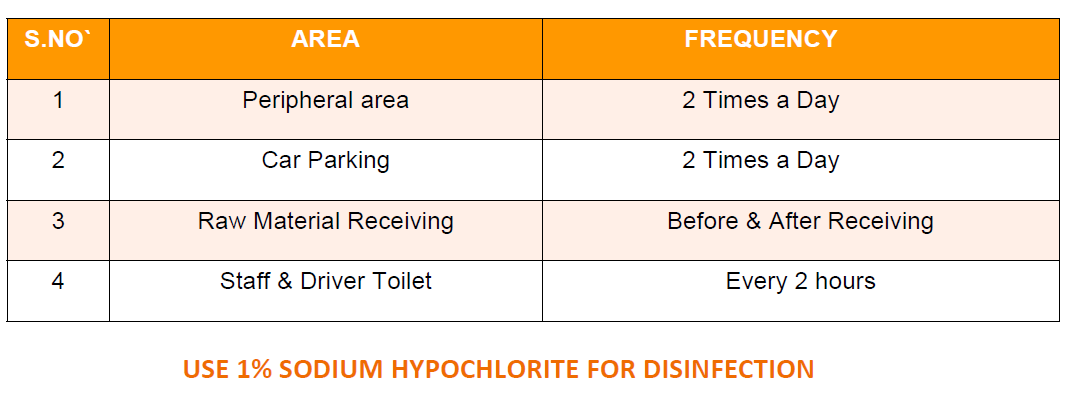

Recommended chemicals
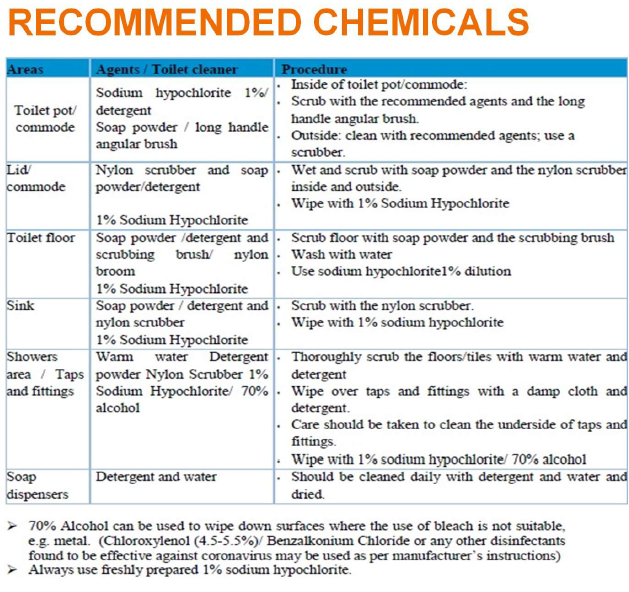
1% sodium hypochlorite solution
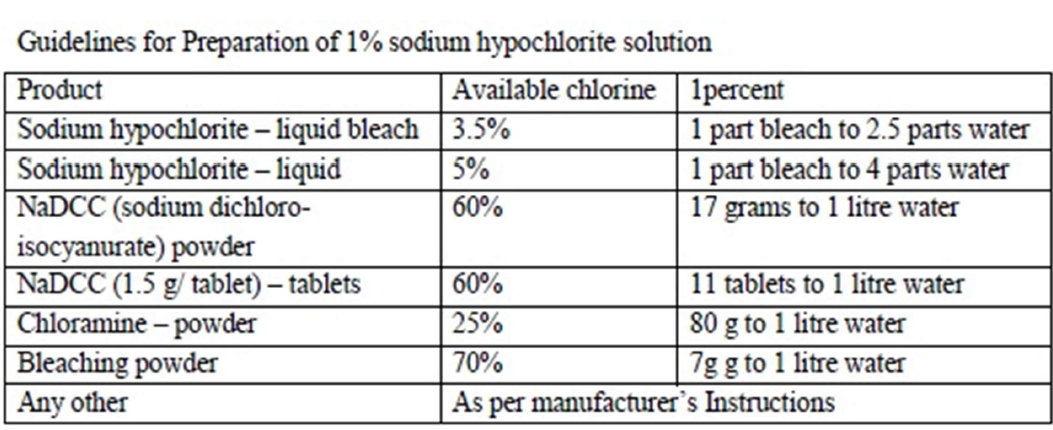
Human Resource & high alertness
- Any person with fever, symptoms of flu should not enter premises
- During work hours anyone develops symptoms immediately isolate get medical advise and assistance
- No person assigned to be quarantined or in contact with infected person shall be allowed to come for work
- Persons resisting for covid 19 procedures or not complying shall be moved out of work
- A register of monitoring health indicators like fever, cough, running nose , sore throat, short breath be maintained
Material handling
- Ensure secondary packing does not enter hotel after receiving.
- If Possible stop primary packing also at store. Transfer it in your own containers or vessels.
- Daily pre-sanitation of receiving inspection rooms with 1% Sodium hypochlorite.
- No reverse traffic of materials into kitchen.
- All items to be handled either with glove or sanitised hand only.
Tips to plan social distancing
- Minimum distance of one meter from person to person in any direction.
- Make a plan to schedule staff at each work station.
- Redefine staff change room rules in terms of resting place, lockers etc so that social distancing is maintained.
- Realign seats in restaurants and ensure 1 m distance between guests even when they are waiting for takeaway orders .
- Declare a receiving timetable so that the material receiving area shall have only one supplier at a time.
Guest rooms
- Remove all amenities like fruit basket, toiletries, snacks etc. and issue it to guest on request.
- Communicate to guest that amenities will be provided on request.
- On check out any amenities placed in the rooms shall be discarded.
- Sanitise TV remotes and high touch points like switches, Chairs, Sofa, Door knobs etc with 70% alcohol.
- Cover the pillows and mattress with Teflon cover.
- Sanitise the carpets by spraying 70% alcohol.
Room service
- Provide Hand Sanitiser at the entry of every room
- Sanitise food trolleys and food trays before and after every service.
- DO NOT serve to the guest at rooms. Greet the guest, keep the food and leave the room
- Assign a trained staff for clearance. No unused packed food served to guest shall be reused.
- Maintain social distancing of 1m with the guest at all times.
Housekeeping Plan
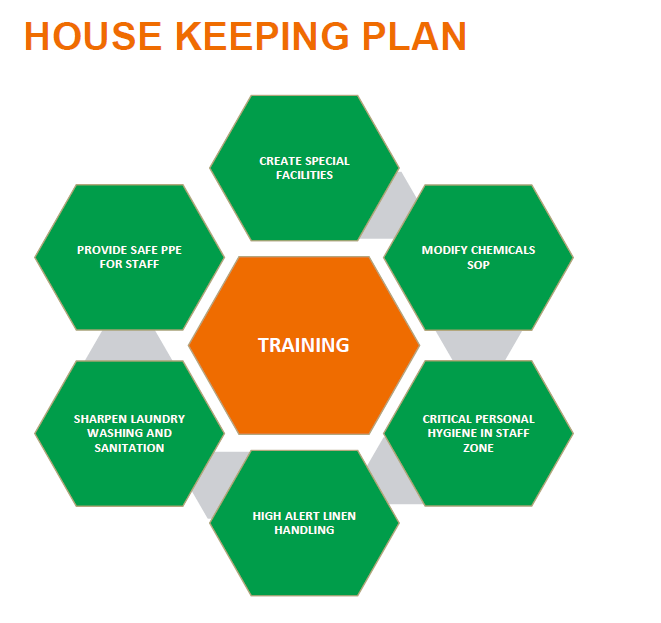
Improved uniforms
- In addition to the normal uniform the following should be given to the staff:
- Gloves to operation staff.
- Individual hand towels.
- Heavy duty gloves for intense cleaning staff.
- Provide proper face masks.
- Daily new uniform.
- Full sleeve long coats for kitchen stewarding, staff area cleaning staff
- Rubber boots for staff at dish wash, pot wash area.
Linen handling- high alert
- Housemen should not do bed making or linen handling without face mask, goggles, head cover, gloves, full sleeves long coat up to knee and rubber boots.
- Removal of guest linen must be left to designated personnel.
- There should be a closed bin mounted in trolley ensuring this directly put in to laundry.
- Avoid individual counting by recount make a counting procedure while removing.
- Give and take any linen through trays or trolleys.
- Train staff in bed making with gloves and masks.
Sharpen Laundry
- Create special sanitised place for landing used linen.
- Segregate clothes through designated person/s using PPE like, full coat, gloves , goggles and face masks.
- Increase temperature of water to above 75 °C to 90°C for bed linen.
- Use disinfectant as per govt guidelines or equivalent chemical after verification.
- Ensure dryers and machine handling parts after every session are sanitised with 70% alcohol based solution.
- Don’t cough, sneeze or spit directly in to clean linen.
- Discard any linen from circulation for time being if stains are deep and of human blood or body fluids.
Special points
- All that guest has touched needs to be disinfected or sanitised.
- Provide fruit basket or cookies or tea/ coffee maker supplies based on guestrequirements.
- No reuse of any occupied guest room amenities is allowed hence be guest specific.
- Concentrate in sanitising phone, door knobs, wash basin and all high touch points like tv remote.
Training
- Special COVID 19 department based handling training.
- Training to managers and supervisors on monitoring and reporting on COVID 19 new
- rules and emergency.
- Training on personal hygiene with AV’s and posters.
- Training on social distancing.
- Training on staff area behaviour, transport and uniform handling specific to COVID 19.
- Training to focus on motivation due to this stress.
Food services / delivery / takeaways
- Food Service Area: Thorough cleaning and disinfection after every meal preparation and common touch points such as door knobs, equipment handles, desk, grocery cart handles, etc.
- Hand wash & sanitation facility: Available to workers, customers especially at the entry
- Prevention of surface contamination: Use barrier such as tongs, gloves or other utensils to prevent direct hand contact with food, especially for uncooked food.
- No open display of ready-to-eat foods, should be kept covered in glass displays
- Visual display of DOs and DONTs
- Pick-up zones for customers to help maintain social distancing.
- Prohibition of self service, buffet, mass gathering
- Disposable items: Use disposable utensils, cutlery, and single use sachet (of salt pepper, sugar, ketchup, etc)
- E- Payments / E-Wallets: Refrain from handling cash. If handled, wash or sanitise hands. Encourage customers to use e-wallets such as UPI, QR codes, net-banking. In case credit/debit cards are used, the card machine to be sanitized with 70 % alcohol after each use.
- Online orders: Encourage customers to place orders online or on telephone, well in advance to reduce the wait time.
Food Delivery: Food Handler
- Face to be covered with a clean mask or face cover. Hands to be sanitised before food pick up and after delivery.
- Physical distancing of 1 meter is followed between self and customer.
- Contact with common touch points such as door bell, handles, etc to be avoided. If unavoidable, hands to be immediately sanitised
- Contactless delivery methods shall be encouraged.
Food transportation & distribution
- Train the drivers, loaders and other staff about the COVID-19 infection symptoms and measures for prevention
- Clean & Sanitize Delivery/transport vehicles regularly. Use vehicle only for food deliveries /distribution.
- Anyone displaying flu like symptoms to avoid handling / transporting / delivering food.
- Hand washing material and Sanitizer bottle to be fixed in driver cabin.
- Face covers to be be worn at all times.
- Avoid use of public toilets and crowded places during the breaks.
- If a vehicle enters an area marked as a COVID-19 hotspot, then the vehicle shall be thoroughly cleaned and disinfected before and after use.
- Maintain relevant records.
World Food Safety Day 2020: Date, theme, significance and quotes
The World Food Safety Day is celebrated every year on June 7 to draw global attention to the health consequences of contaminated food and water. Here are some food safety quotes which you can share with your friends and family.

Human beings are dependent on a few basic needs for living. Food (including water), cloth and shelter are the minimum requirements of a person for a decent standard of life.
Food is a necessity; throughout history, food has acted as a catalyst for societal transformation, development and expansion. But now, food safety is becoming an important issue.
The way in which food is produced, stored, handled and consumed affects the safety of our food. The absence of food safety may harm the health of consumers. Hence, to mark the importance of food safety, the World Food Safety Day is celebrated every year.
Ralph Waldo Emerson once said, "The first wealth is health."
The principles of food safety aim to prevent food from becoming contaminated and causing food poisoning.
The United Nations (UN) has assigned two of its agencies, the Food and Agriculture Organization (FAO) and the World Health Organisation (WHO) to lead efforts in promoting food safety around the world.
When was the first World Food Safety Day celebrated?
In 2018, the United Nations General Assembly declared June 7 as the World Food Safety Day. June 7, 2019, marks the first anniversary of World Food Safety Day and the theme for World Food Safety Day 2019 was 'Food Safety, everyone's business'.
World Food Safety Day 2020: Date
World Food Safety Day is observed on June 7 to draw global attention to the health consequences of contaminated food and water.
"Your diet is a bank account. Good food choices are good investments." -Bethenny Frankel
Today is the second anniversary of World Food Safety Day (WFSD). Through this day, WHO pursues its efforts to mainstream food safety in the public agenda and reduce the burden of food-borne diseases globally.
World Food Safety Day 2020: Theme
According to the World Health Organisation (WHO), under the theme 'Food safety, everyone's business', the action-oriented campaign will promote global food safety awareness and call upon countries and decision-makers, the private sector, civil society, UN organizations and the general public to take action.
Food safety is a shared responsibility in which everybody has a role to play. It is our duty to ensure that the food we consume is safe and will not cause damages to our health.
"Healthy citizens are the greatest asset any country can have." -Winston Churchill
"Food safety is key to achieving several of the Sustainable Development Goals and World Food Safety Day brings it into the spotlight, to help prevent, detect and manage foodborne risks. Safe food contributes to economic prosperity, boosting agriculture, market access, tourism and sustainable development," according to a WHO report.
On this World Food Safety Day, here are some quotes which you can share with your friends, family or on social media pages like Facebook, WhatsApp, Instagram and Twitter with the hashtags #WorldFoodSafetyDay #ZeroHunger to raise the importance of food safety.

World Food Safety Day 2020 poster (Image source: un.org/en/observances/food-safety-day)
World Food Safety Day quotes
"We're going to do everything possible to make sure that food safety is always paramount, and that we work with the industry as aggressively as we can to make sure that we're paying attention to the food-safety issues." -Mike Johanns
"Sorry, there´s no magic bullet. You gotta eat healthy and live healthy to be healthy and look healthy. End of story." -Morgan Spurlock
"The food that enters the mind must be watched as closely as the food that enters the body." -Pat Buchanan
"Get people back into the kitchen and combat the trend toward processed food and fast food." -Andrew Weil
"Eat breakfast like a king, lunch like a prince, and dinner like a pauper." -Adelle Davis
"Let your food be your medicine, and your medicine be your food." -Hippocrates
"Food safety involves everybody in the food chain." -Mike Johanns
Food t is the third most basic thing for life after air and water. It is the starting point for our energy which keeps us healthy and support well-being. People often take for granted that it is safe, but in an increasingly complex and interconnected chain.
Hence, through the World Food Safety Day, WHO pursues its efforts to mainstream food safety in the public agenda and reduce the burden of foodborne diseases globally.
Subscribe to:
Comments (Atom)


